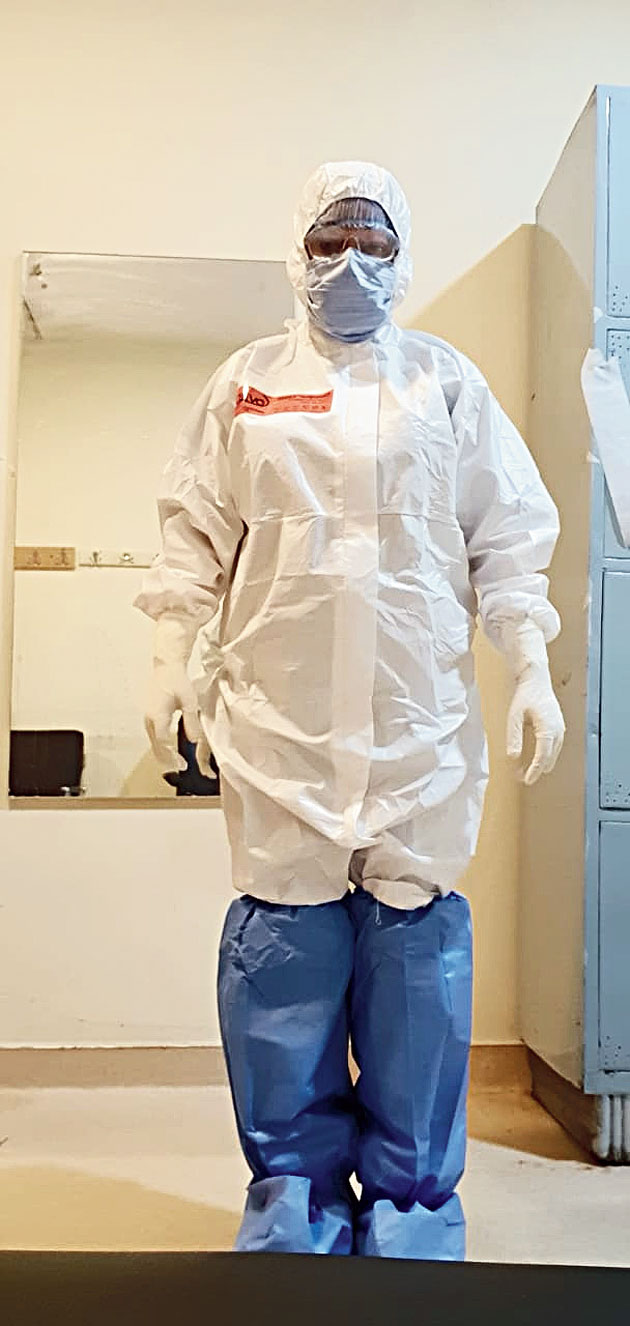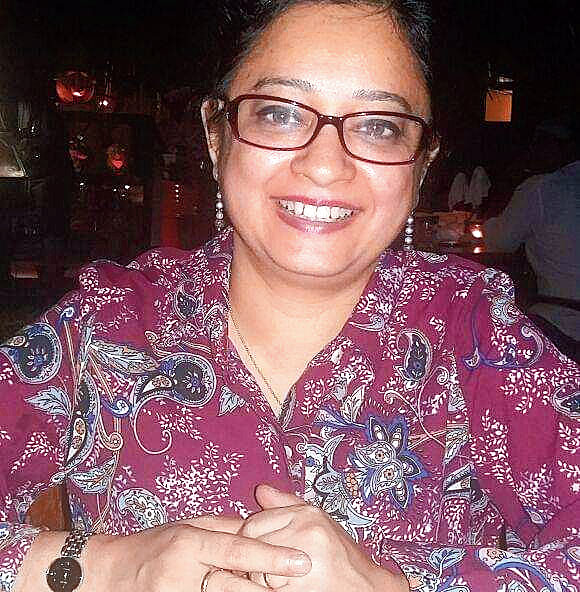Sushmita Roy Chowdhury, a chest specialist who is treating Covid-19 patients at Apollo Hospitals, answers some frequently asked questions on the dreaded virus and how to fight it. Over the last week, the resident of Sanjeeva Town has instructed office-bearers of various residential complexes in the NKDA’s newly set-up Covid-19 war room and held an awareness meet for her own neighbours.
On identifying Covid-19 symptoms…
This is influenza season. But how to recognise the difference between flu and Covid-19? If you are in contact with someone infected and if your nose is blocked, you are suffering from body and head ache, you develop fever and have an upset stomach, have a dry cough and sore throat… it begins with such non-specific symptoms.
This flu can affect people in two ways. There are those with influenza-like illness. They have fever over seven-eight days, loose motion, body ache etc. They recover on their own. The other category is severe acute respiratory illness. They have breathing trouble.
If a Covid-positive person is over 65, or has diabetes, hypertension, asthma, COPD, kidney disease or is under cancer treatment, he cannot stay at home and should be hospitalised.

Sushmita Roy Chowdhury geared up to enter the Covid ward Sourced by the Telegraph
But it is a good decision of the government to allow patients with mild symptoms to self-isolate at home. One can stay in the comfort of one’s room and avoid expenditure on health while pressure is not added on the healthcare system. But home isolation comes with a caveat — you have to be your own police. You have to be under regular observation or on video call with a doctor you have to report to daily. If shortness of breath develops, you have to go to hospital.
It is helpful to keep a pulse oxymeter at hand. It is not expensive, costing less than Rs 2,000. If someone is getting breathless, it is better to check his oxygen saturation level. If the level falls under 93 per cent, immediately go to a designated Covid-19 hospital. Reaching the hospital when oxygen saturation has dropped to 80 per cent is not a smart thing to do as the patient is already in a serious condition.
On the type of mask to wear…
Cloth masks are no good, neither is N95 needed. Use a three-ply surgical mask. N95 masks are only for those who are dealing with high volume of viral load, such as healthcare workers like us who are working in Covid wards. For example, when nebulisation is being done on a Covid patient and aerosol gets generated, a light mask will not work as there is high risk of virus spread. Someone on home quarantine and his carer can use a three-ply surgical mask. The World Health Organisation has specified that cloth mask should be avoided.
On taking public transport…
We, from the middle classes, cannot avoid taking public transport while going to work. But if you were used to leaving home at 9.30am, do so at 8.30am now. Be prepared to miss buses if they are too crowded. Do not stand face to face with anyone. If you are travelling in a taxi, roll a window down and let fresh air in even if the AC is on. Sit at the back and make sure the driver is wearing his mask. The mask has to be in place, not under the nose. Otherwise, you are leaving an entry free for infection. The virus has two portals of entry — your nasal passage and your mouth. Wearing gloves makes some people complacent. Don’t touch your mask or your face repeatedly with your gloved hand. Some have a habit of lowering the mask while talking. That is more dangerous. We have to learn to speak with the mask over our nose. People like me working in Covid wards for the last three months should have been infected by now. If that has not happened, it is only because we are taking precautions. This is not such a deadly virus if you take precautions. If it enters our body, no one knows how it will behave. So we have to prevent its entry into our body by taking precautions.
On the regimen to follow when coming home from work…
Leave your shoes outside the house if there is space to do so. Otherwise put them in a plastic bag and take inside. Many people have a bad habit of spitting on the road, so there is no knowing what your soles are carrying underneath. People are washing vegetables but they care little about shoes. Change out of the clothes you went out in and wash your hands with soap and water for 20 seconds. Dump the clothes and wash them separately from other clothes in hot water and soap. This is a weak virus and has a fat layer that gets washed away by soapy water.
On eating out…
Don’t eat anything outside that has been cooked earlier. If it is piping hot and cooked in a clean environment, it’s ok. Carry food and water from home if you can for the next two months. The less you interact with people the better. In a sweet shop, the sweets may be safe to have but what about the man serving you? How do you know if he is an asymptomatic carrier or not? Infection can spread from the hand if the person is affected. Since there is community spread now, it is wise to reduce interaction. We don’t know whether we have reached the peak (of infection) or not. Two months later, the risk should come down.
On asymptomatic carriers…
A Covid-positive person doesn’t have to cough to infect others. Of course, when a person is coughing, droplets go out with more force. But even when you talk, there are droplets produced. That is why a distance of two to three metres is suggested even when you are speaking to someone. If you speak loudly, more droplets are generated. When you wear a mask, after an hour or so it starts smelling. This is because droplets are forming a layer inside.
On home isolation…
Being in home isolation means being confined to a single room with attached toilet. You have been given an opportunity to reduce your viral load in familiar surroundings. Wash your own dishes. Do not share your towel with anyone. Wear a mask at all times. You cannot go out and have dinner or watch TV with the rest of the family. Isolation has to be a disciplined affair. Otherwise you will infect your family. As for waste disposal, the government has a policy which the civic body advises the family about.
On a personal level…
My family was worried about whether I would get infected. My mother is 79 and stays with me. I was worried about infecting her. At work, the big hurdle was getting used to wearing PPE. You sweat like a pig even in air-conditioned atmosphere. As a consultant, I do my rounds and come out from the Covid ward in about four hours. But my junior colleagues stay in for six to eight hours. They cannot go to the toilet. By the time they come out, their body salts are low, they are hungry, thirsty and dehydrated, and have headaches.
PPEs take 20-25 minutes to put on and an equal time to take off. If you are not careful, you can end up infecting yourself while disposing it.
As a chest specialist, I do not go to the ward daily. Otherwise, my exposure will be very high. In our hospital, there is a team of six consultants. Each of us visits the ward once a week and discusses cases with others. In the out-patient department too, I do not see more than eight patients per day so there is a gap between patients. My husband, who is also a doctor, has set up the guest room at home for me where I have isolated myself. It has become a habit over these three months.
On non-Covid illnesses…
Please do not neglect other diseases by avoiding treatment. Hospitals are taking care to separate Covid wards from non-Covid treatment areas. With the rains starting, it is time for the onset of dengue. The symptoms for that too are headache and fever. We are holding fever clinics to separate patients who are found to have more than 99°F temperature in the thermal gun screening at the entry point. Such people are not allowed to go to the OPD.
Do you have a Covid-related question for Sushmita Roy Chowdhury? Write to The Telegraph Salt Lake, 6 Prafulla Sarkar Street, Calcutta 700001 or email to saltlake@abpmail.com











